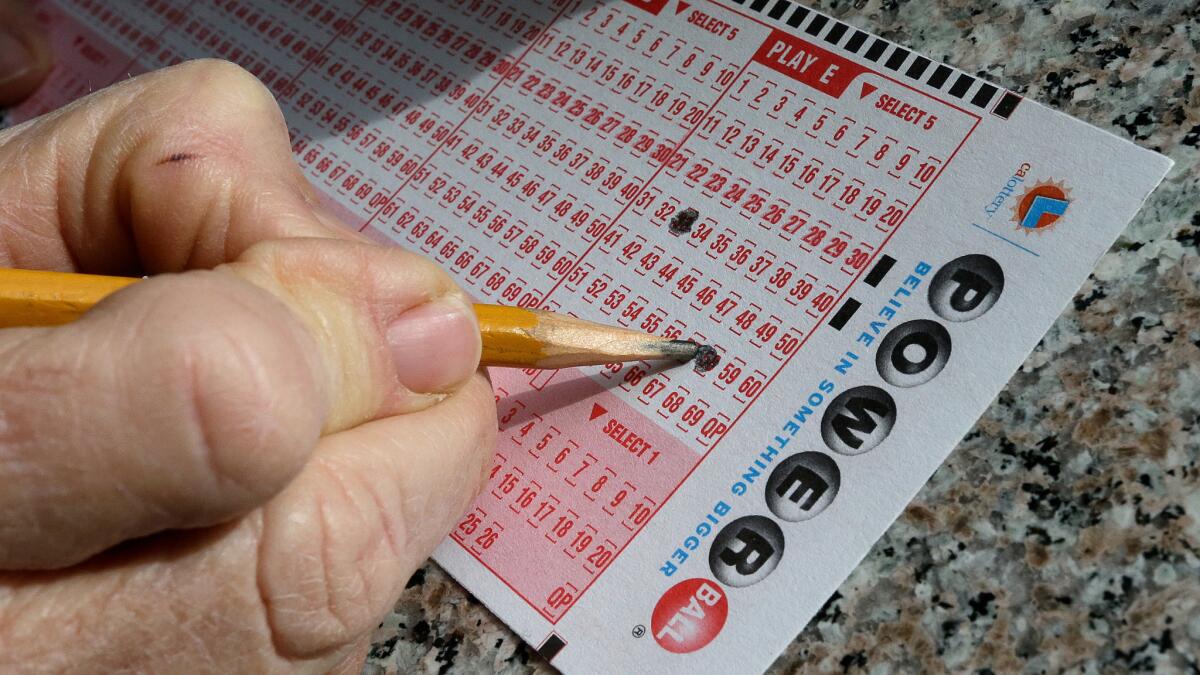Forget Mega Millions’ $454 million prize — where is the Chino Hills Powerball ticket?

- Share via
There may be only a 1 in 258 million chance that someone will win tonight’s $454 million Mega Millions jackpot, but there is a 100% certainty that the winning $528.8 million Powerball ticket is still floating around in the world somewhere.
The only question is: Who has the ticket?
State lottery officials say it’s not unheard of for ticket holders to intentionally wait months before claiming their prize, but some do it by accident.
The Jan. 12 Powerball jackpot was the biggest in U.S. lottery history at $1.6 billion. The prize was split among three ticket buyers, but only two have claimed their winnings.
Like all Powerball winners, the third ticket holder was given a year to claim the jackpot. With half of that grace period now gone, some lottery officials are wondering whether the winner even realizes he or she has — or had — the winning ticket.
“It’s really 50-50 in my mind now,” said California State Lottery spokesman Alex Traverso. “It’s slightly leaning toward the person may be unaware.”
Some lottery winners take their time to claim a payout so they can get their financial ducks in a row, Traverso said. Lottery winners in the past have spent months with financial planners and attorneys preparing for the onslaught of media, as well as relatives who come out of the woodwork looking for a handout.
Other times, a group of people share the ticket, such as a work pool, and everyone struggles to reach a unanimous decision on how to claim the prize, Traverso said.
“Who knows. Maybe they have their financial house in order, and maybe they decided they’re going to move and the last step is going to be coming in with the ticket. It’s all speculation,” Traverso said.
According to lottery rules, winners of the Mega Millions and Powerball jackpots have up to a year to claim the prize and under most circumstances, need to have the ticket to prove ownership.
Read the latest Essential California newsletter »
However there are exceptions, Traverso said. Some winners who have lost their ticket may be able to substantiate their right to a jackpot by answering questions that only a winner would know, such as when and where they purchased the ticket.
“There’s a laundry list of questions. It’s not easy. You’re going to feel like you’re getting the third degree,” he said. “It’s not a dimly lit room with a light bulb and steel table, but you’ll be subject to an investigation, need to answer questions. We have all the answers. So you have to be able to provide those answers.”
The winning ticket purchased in California on Jan. 12 was bought at a 7-Eleven in Chino Hills.
The state may have images of the possible winner based on the time the sale was recorded with the state and security camera footage, but the rush to buy tickets was so big that day, there’s no way to pinpoint the specific person who bought the ticket, Traverso said.
The state could release photos of potential winners or send out occasional media notices pleading with tips to find the winner, but neither is likely to happen for the record Powerball ticket, he said. That’s because earlier this year, about three dozen people all claimed to be the winners of a $63-million SuperLotto Plus ticket in Chatsworth in February.
So far, none of the claimants for the Chatsworth ticket have been found credible.
“Because that experience went down the way it did, we’ve had to reevaluate the way we did it,” Traverso said.
Discussing the Chino Hills Powerball ticket, Traverso concluded, “We don’t have any more details to share. It’s not like we have more information we can offer up.”
For breaking California news, follow @JosephSerna on Twitter.
MORE LOCAL NEWS
Cloning great schools is latest in long line of L.A. reform plans
Beverly Hills accused of driving homeless man out of town with private security
Samosas, sambusas and pizza: How Californians end their Ramadan fasts
More to Read
Sign up for Essential California
The most important California stories and recommendations in your inbox every morning.
You may occasionally receive promotional content from the Los Angeles Times.










